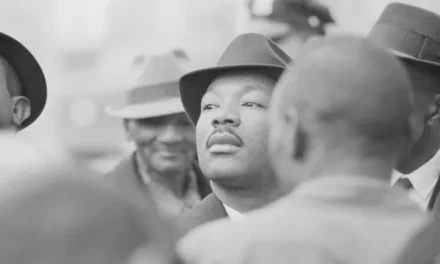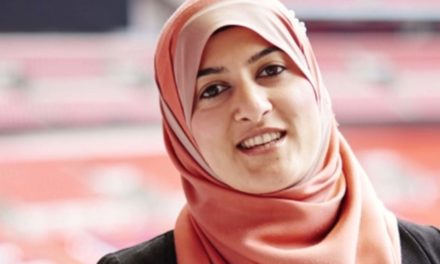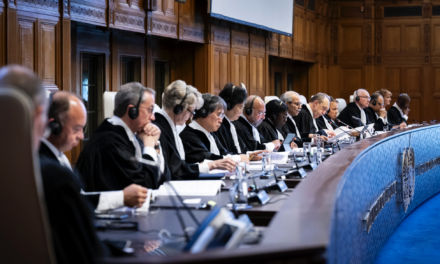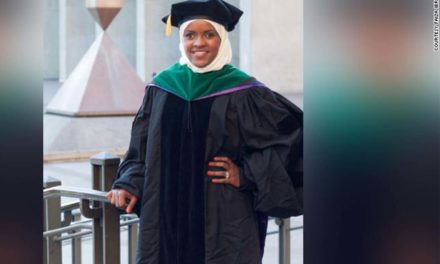Mukhtar Ibrahim as “‘Monster in Our Community’: East African Youth Break the Silence Over Addiction” for Sahan Journal
A woman embraces Biftu Jillo after she gave an emotional speech at the Brian Coyle Center on the evening of Oct. 26, 2019, about her past addiction. Dymanh Chhoun | Sahan Journal
Biftu Jillo sat before a gathering of East African youth and women at the Brian Coyle Center Saturday night to talk about drug addiction — an intensifying problem in the community usually spoken of in private, if at all, and sometimes in whispers.
It’s a scourge she knew well. Biftu, 33, spoke of her past addiction to painkillers and warned that the Somali and Oromo communities needed to talk openly about the problems of young people addicted to drugs.
“Nobody wants to be a drug addict,” said Biftu, who became addicted to OxyContin at 17 after a dentist prescribed it for pain relief following surgery. “Nobody goes up and says, ‘Hey, I’m going to be a drug addict when I grow up,’” she said, tearing up. “Nobody.”
Addiction has long been a source of shame in immigrant communities, where children’s overdoses are often cloaked as heart attacks or unexplainable deaths.
Some young Twin Cities advocates are working now to push the problem into the light in the hope of saving lives. Gatherings like the one at the Coyle Center are a start.
Community members say the honesty can’t come quickly enough.
Addiction’s grip
Many first-generation Americans are at a breaking point as they straddle between their newly adopted home and the land their parents fled.
In a break from tradition, they have organized and invited their friends who became addicted to drugs — considered a sin in Islam and a taboo subject to talk about in their culture — to testify to their addiction and recovery.
In September, they formalized their effort as Generation Hope, a nonprofit organization formed by youth who’ve lost friends to drug overdoses.
The community is finally paying attention after so many families have lost their children to fentanyl overdoses and other drugs.
Abdirahman Warsame, one of the co-founders of the organization, said they want to have open discussions about substance abuse in a safe space where youth can talk openly about their addiction.
“The only reason we are doing this is because we feel like no one would understand or care if we didn’t step up to the plate,” Abdirahman said. “Everyone that’s part of our organization, including Biftu, has had some kind of experience with substance abuse or gang violence or both. Through our stories and the community’s support, everyone can feel our pain too.”
Some of his co-founders got addicted to drugs before and are now sober.
They held their first event on Sept. 28 after four young boys died of overdoses in a month.
The group said their friends died after taking fentanyl, which Abdirahman called a “monster that has been raging in our community.”
The group plans to hold ongoing community conversations about addiction.
“We want to change how parents or the community view drug addicts and how they can support those individuals,” said Khadar Abi, one of the co-founders and a former drug addict who now works at Alliance Wellness Center in Bloomington, which offers substance abuse treatment programs.
Qalid Ibrahim, another co-founder, said he got addicted to drugs slowly, first smoking marijuana.
“It got to a point where I could not eat or sleep without it,” he said. “After some time, I needed to look for something new.”
He started taking opioids.
“After I tried it, at first it was fun,” he said. “But then it got to a point where I was spending $100, 150 a day, and still I wasn’t feeling anything. Day in day out, every time I would need it. And If I didn’t get it, I would get sick.”
Then he found fentanyl. He overdosed a few times.
“At first it’s about getting high,” he said. “After some time, it becomes like a big monkey on your back.”
‘Not our kid’
Mothers and youth who spoke at Saturday night’s gathering say the generational gap between parents and their U.S.-raised children is weakening the traditional family structures.
Immigrant parents, steeped in traditions, are usually not aware of the drug problem, assuming their children will never indulge in alcohol or drugs.
When they find out, guilt and shame wash over them. They discourage their children from seeking help because of fear of being shunned and stigmatized in the tightly knit community. Families create cover stories when a loved one dies after an overdose.
“It’s serious, and then we think it’s not our kid until your kid is dead,” Biftu, who’s half Somali and half Oromo, told the Saturday night gathering. “We’re not losers. We’re human beings. We’re Muslim. We’re alive. We’re here.”
As Biftu was speaking, a woman wearing a sweatshirt with the words “Health Communities” came up to her, placed her hands on her head, embraced her and kissed her on the head. Biftu wiped tears from her eyes.
“Imagine being a mom burying your kid and lying about why your kid died,” said Biftu, who’s a mother of four children. “You know how that would hurt?”
The youth, who have a different cultural perspective than their parents, are now taking their stories public.
“Addiction is real, and it’s hitting this community harder than ever because of our ignorance,” Biftu said. “We just want to hide stuff. Bury your shame. Bury your shame. No. It’s way past shame.”
“Start judging less,” she told community members.
That starts with the parents, said Biftu, who recounted how, after she and her mom reached an impasse, came to understand each other.
“When I think of how much pain I caused my mom it just makes me cry to this day,” she said.
She recalled the time when she broke down to her mom and told her, “Mom, why are you discouraging me all the time? You are my mom. You’re the person I’m supposed to come and talk to about my problems. I’m supposed to trust you.”
Her mom changed. She started listening to her daughter and pushed her to go to treatment.
“I know too many people who died that I’m close to,” Biftu said. “They shouldn’t be dead. They didn’t even make it to their 30th birthday.”
“I know the pain,” Biftu told Sahan Journal later about her decision to talk openly about addiction and against the cultural norm to stay quiet. “I want to fight against it, and the only weapon I had was my voice. I want to speak for all my sisters and for all my friends.”














